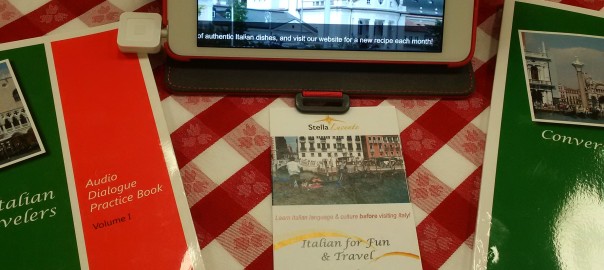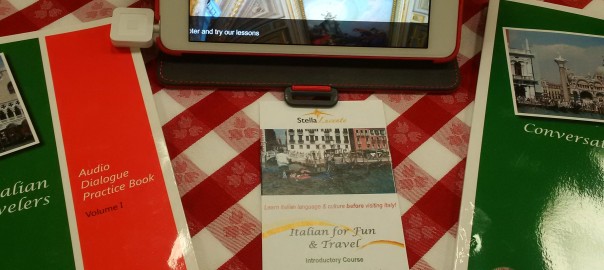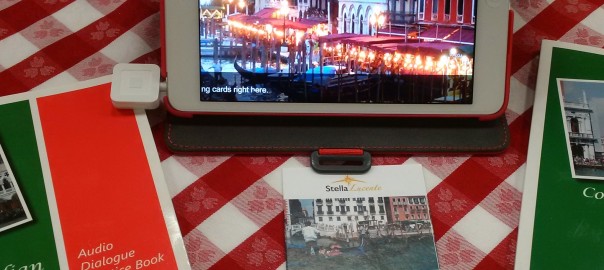Imperfetto Subjunctive for Past Tense (Part 3): Speak Italian!
The Italian subjunctive mood is easy to conjugate for use with the Italian past tense, but tricky to use!
Speak Italian: How to Use the Imperfetto Subjunctive Mood
Can you speak Italian? By now, many of you have passed the beginning stages of learning to speak Italian and can read and comprehend quite a bit of the Italian language. Meraviglioso!
But have you tried to take the next step to speak Italian fluently? Can you use the Italian subjunctive mood when you are speaking in the past tense? To express complex feelings in Italian correctly, it is important to use the Italian subjunctive mood. Using the subjunctive mood is difficult for English speakers, as we only rarely use this tense in English, and this is something that I am always working on! This is the third blog in the “Speak Italian” series that will focus on how to conjugate and use the imperfetto subjunctive mood, or “il congiuntivo” for speaking in the past tense.
Let’s take that giant step from simple beginning sentences to more complex and fluid sentences in Italian by using the imperfetto subjunctive mood while speaking in the past tense. In this segment, we will discuss when the helping verbs dovere, potere and volere take the subjunctive mood.
We will also repeat the Italian conjugation of the imperfetto subjunctive form for the regular and irregular -are, -ere, and -ire verbs and then present the conjugation of the modal, or helping, verbs dovere, potere, and volere. Finally, we will revisit the trapassato subjunctive mood from our previous blog on Italian hypothetical phrases. Example sentences will follow!
Speak Italian: How to Use the Imperfetto Subjunctive Mood
In each blog in the “Speak Italian” series about the imperfetto Italian subjunctive mood (“il congiuntivo”), we will first present phrases that take the Italian subjunctive mood.
Then, we will review how to conjugate the imperfetto subjunctive mood.
Finally, we will present common phrases from daily life that take the imperfetto subjunctive mood.
Remember these examples as “anchors” in your knowledge for when you must speak Italian and try out the imperfetto subjunctive mood in your next Italian conversation!
Enjoy the third blog in this series, “Imperfetto Subjunctive for Past Tense (Part 3): Speak Italian!”
—Kathryn Occhipinti
Some of this material is adapted from our textbook, Conversational Italian for Travelers © 2012 by Stella Lucente, LLC, found on www.learntravelitalian.com. Special thanks to Italian instructors Simona Giuggioli and Maria Vanessa Colapinto.
Speak Italian: How to Use the Imperfetto Subjunctive Mood (Part 3)
Once Again… Italian Phrases That Take the Imperfetto Subjunctive Mood
Italian has a subjunctive mood that is used to express beliefs, thoughts, or hopes with the verbs credere, pensare, and sperare.
The subjunctive mood is also said to “open up” a conversation to discussion about a particular topic by expressing doubt, uncertainty, desire, or a feeling.
Certain phrases are commonly used to start a sentence in order to introduce the subjunctive mood, and these initial phrases will be in the indicative tense (the “usual” present or past tense). These initial phrases imply uncertainty and trigger the subjunctive mood in the phrase to follow.
We have already learned to use the imperfetto subjunctive mood with the conditional tense in our blogs about Italian hypothetical phrases! Now, as stated before, we will focus on the use of the imperfetto subjunctive mood after introductory phrases that are in the past tense.
In our first blog about the imperfetto subjunctive mood, we learned that these initial phrases fall into several groups. We discussed Groups 1 through Group 6, which are given below for review.
In our second blog about the imperfetto subjunctive mood, we discussed Groups 7 and 8.
These groups are again listed below for review.
In this blog, we will discuss phrases that express feelings (any emotion, fear, or surprise) in Group 9 and describe the situations in the past in which they are used to introduce the imperfetto subjunctive mood.
We will also now discuss Group 10, in which we list individual words that refer to the purpose or timing of an action that, when in the past, must be followed by the imperfetto subjunctive mood. These words are part of “adverbial clauses” that modify verbs. As such, they are often used in the phrase that completes a sentence, but can also be found at the beginning of a sentence. Many of these words are easy to recognize since they end in -che.
Finally, Groups 11 and 12 are individual adjectives or pronouns that can introduce another clause and when describing the past must be followed by the imperfetto subjective mood.
At the end of the list, we will also include the topic of a series of blogs on Italian hypothetical phrases, to complete our discussion of specific words or phrases that can be used to introduce the subjunctive mood.
Groups 1-9: “Noun Clauses”
Group 10: “Adverbial Clauses”
Groups 11 and 12: “Adjective/Pronoun Clauses”
-
-
- Phrases that use the verbs credere (to believe), pensare (to think), and sperare (to hope). These verbs use the pattern: [verb + di + infinitive verb] to describe the beliefs, thoughts, or hopes that one has. When the subject in the introductory phrase is not the same as the subject in the subjunctive clause that follows, the pattern changes to: [verb + che + subjunctive verb].*
- Impersonal constructions that begin with, “It is…” such as, “È possibile che…”
- Phrases that express a doubt, such as, “I don’t know…” or “Non so che…”
- Phrases that express suspicion, such as, ” I suspect that…” or “Sospetto che…”
- Phrases that express uncertainty, such as, “It seems to me…” or “Mi sembra che…” and ” To wonder if…” or “Chiedersi se… “
- Impersonal verbs followed by the conjunction che, such as, “Basta che…” “It is enough that,” or “Si dice che…” “They say that…
- Phrases that use the verbs volere, desiderare, chiedere, esigere when the subject in the introductory phrase is not the same as the subject in the clause that follows. In this situation, these verbs will be followed by che.
- Phrases that use the verbs piacere and dispiacere when the subject in the introductory phrase is not the same as the subject in the clause that follows. In this situation, these verbs will be followed by che.
- Phrases that express feelings (any emotion, fear, surprise) and use the pattern: [avere, essere, or augurarsi verb + di + infinitive verb]. When the subject in the introductory phrase is not the same as the subject in the clause that follows, the pattern changes to: [avere, essere, or augurarsi verb + che + subjunctive verb].
- Sentences that begin with words that end in –ché, or complex conjunctions that end with che: affinché, perché (so as, so that, in order that), purché (as long as, provided that, only if)**, a meno che, senza che (unless), può darsi che (it may be possible that, possibly, maybe), prima che (before that). Also the many words that mean although/even though, one of which ends in -che: benché (also sebenne, malgrado, nonostante).***
- Sentences that begin with adjectives or pronouns that include the idea of any in a description of a person, place or thing: qualsiasi, qualunque (any), chiunque (whoever), dovunque (anywhere).
- Sentences that begin with adjectives or pronouns that include the idea of nothing or only in a description of a person, place, or thing: niente che, nulla che (nothing that), nessuno che (nobody that), l’unico, il solo, a che (the only one that).
-
Hypothetical Phrases: Phrases that begin with se (if) in certain situations. Phrases that begin with come se (as if), magari (if only) and ammesso che (assuming that).
As usual, there are summary tables in the next section that shows how to use these phrases. The present tense is in the left columns. The imperfetto past tense has been chosen for the right columns, although in some situations, the passatto prossimo past tense can be used as well. We will then present examples for the past tense.
Points to remember about the subjunctive mood:
In Italian, the introductory phrases that take the subjunctive mood (those that trigger doubt, uncertainty, desire, or a feeling) usually end with a linking word, also known as a conjunction, which will be che. In this situation, che means that. The clause that follows our introductory phrase will then describe what the uncertainty is about.
We now see from Group 9 that some introductory words or phrases already have -ché or che integrated into the word itself. In these cases, che is not repeated.
*When the speaker in the introductory phrase will carry out the action in the phrase to follow, Italian will use the following construction to link the phrases for credere, pensare, and sperare : di + infinitive verb. Example: Penso di andare a Roma domani. = I think I will go to Rome tomorrow. (Use pensare a when thinking ABOUT something or someone.)
**solo se also means only if but does NOT take the subjunctive mode.
*** anche se also means even though/if but does NOT take the subjunctive mode.
How to Express One’s Feelings with “Di” and “Che” and the Italian Subjunctive Mood – Present Tense
Phrases Used to Express Feelings with “Di” in Italian
When expressing one’s feelings in Italian in the first person (io conjugation), many common Italian expressions are followed by di (of). In this case, when di is followed by another verb, the verb in the second phrase will be in the infinitive tense (if you remember, infinitive verbs end in -are, -ere, -ire, and translate as “to…”). Below are some examples of these phrases, along with example sentences, adapted from Chapter 7 of the Conversational Italian for Travelers textbook.
| avere bisogno di | to have need of | Ho bisogno di… riposare. |
| avere paura di | to be afraid/have fear of | Ho paura di… guidare. |
| avere voglia di | to feel like | Ho voglia di… mangiare una pizza. |
| essere certo di | to be certain of | Sono certo(a) di… ricordare il tuo nome. |
| essere sicuro di | to be certain of | Sono sicuro(a) di… ricordare questo posto. |
| essere felice di | to be happy to | Sono felice di… incontrare mio cugino oggi. |
| essere fortunato di | to be lucky to | Sono fortunato(a) di… mangiare questa cena. |
| essere libero di | to be free to | Sono libero(a) di… viaggiare. |
| essere stanco di | to be tired of | Sono stanco(a) di… lavorare. |
| temere di… | to be afraid of | Temo di… essere in ritardo. |
| augurarsi di… | to wish/to hope (of) | Mi auguro di… fare una buona vacanza. |
How to Express One’s Feelings with “Di” and “Che” and the Italian Subjunctive Mood – Past Tense
Phrases Used to Express Feelings with “Che” and the Imperfetto Subjunctive Mood
Some of the expressions listed in the following table are most commonly used with the same subject for the second phrase. As noted in our previous discussions, these phrases will be followed with “di” and an infinitive verb. They are reprinted here to correspond with the previous table, followed by an asterisk and an explanation in parentheses.
For most of the expressions of feeling that we have been talking about, though, it is possible to express a feeling that the speaker (io) has regarding another person or people. In this case, then, these expressions must be followed by che, and the subjunctive mood should be used for the verb in the second phrase.
The above rule for using che + subjunctive applies whether the introductory phrase is in the present tense or the past tense.
However, if the introductory verb is in the past tense, the imperfetto subjunctive form is the form to follow!
In our example table, we will illustrate this by following the Italian phrases in which the subjects can be different with ...che tu, which we know means …that you, although of course, this rule follows no matter which subject pronoun we use.
Phrases Used to Express Feelings with “Che” and the Imperfetto Subjunctive Mode
| Present Tense Subjunctive Phrase Group 8 |
Past Tense Subjunctive Phrase Group 8 |
|||
| Ho bisogno… che tu | I need… that you*
*(This expression is not commonly used in Italian to tell another person what needs to be done; voglio che is used instead.) |
Avevo bisogno… che tu | I needed… that you*
*(This expression is |
|
| Ho paura… che tu | I am afraid… that you | Avevo paura… che tu | I was afraid… that you | |
| Ho voglia di… * | I feel like… * *(always used with the same subject +di in both phrases) |
Avevo voglia… * | I felt like…*
*(always used with
|
|
| Non sono certo(a)… che tu |
I am not certain… that you |
Non ero certo… che tu | I was not certain… that you | |
| Non sono sicuro(a)… che tu |
I am not certain… that you |
Non ero sicuro… che tu | I was not certain… that you | |
| Sono felice… che tu | I am happy… that you | Ero felice… che tu | I was happy… that you | |
| Sono fortunato(a)… che tu | I am happy… that you | Ero fortunato(a)… che tu | I was fortunate… that you | |
| Sono libero(a) di… *
|
I am free… * *(always used with the same subject +di in both phrases) |
Ero libero(a)… * | I was free… * *(always used with the same subject +di in both phrases) |
|
| Sono stanco(a) di…
|
I am tired…*
*(always used with the same subject +di in both phrases) |
Ero stanco(a)… * | I was tired…*
*(always used with |
|
| Temo… che tu | I am afraid… that you |
Temevo… che tu | I was afraid… that you | |
| Mi auguro… che tu | I hope… that you | Mi auguravo… che tu | I hoped… that you |
Idiomatic Use of the Italian Subjunctive Mood
The final group of words in the table below take the subjunctive mood when used to start a sentence. These conjunctions, adjectives, and pronouns imply that a second phrase is necessary to complete the sentence.
The above rule for using che + subjunctive applies whether the introductory phrase is in the present tense or the past tense.
However, if the introductory verb is the past tense, the imperfetto subjunctive form is the form to follow!
Only the most commonly used have been given in the table. For a more complete list, see the list in the first section of this blog.
| Phrases Used to Introduce the Subjunctive Mood—Idiomatic |
| Present Tense Subjunctive Phrase Groups 9, 10, 11 |
|
| Prima che | Before that ( Prima che is used to mean “before that” and followed by the subjunctive when the subject in the first phrase is different from the subject in the second phrase; use Prima di + infinitive verb when the subject of both phrases is the same.) |
| Benché, Sebbene | Although, Even though, If |
| Può darsi che | It may be possible that, Possibly, Maybe |
| Affinché | So as, So that, In order that |
| Perché | So that (Perché is only used in the subjunctive mood when it means “so that.” Other meanings of perché include “why” and “because,” and in these cases, the subjunctive mood is not used.) |
| Purché | As long as, Provided that, Only if |
Finally, our usual reminder:
DO NOT USE THE SUBJUNCTIVE WITH THE FOLLOWING THREE PHRASES!
Forse = Perhaps
Per me = For me
Secondo me = According to me
The above may seem like exceptions to the rule, but perhaps… because these phrases already express doubt or your personal opinion… in the Italian way of thinking, it would be redundant to use these phrases along with the subjunctive!
And, two more phrases we can now add that DO NOT take the subjunctive mood:
Solo se = Only if
Anche se = Even though/if
Speak Italian: Imperfetto Subjunctive Mood (Part 3)
How to Conjugate the Imperfetto Subjunctive Mood for -are, -ere, and -ire Verbs
Luckily, there are only a few irregular stem forms to learn for the imperfetto subjunctive mood, making it an easier tense to learn than the present, future, and conditional tenses.
Also, the imperfetto subjunctive mood endings are always regular and will be the same for all three conjugations!
To change any regular infinitive verb into the imperfetto subjunctive mood, first drop the final -re, from our infinitive -are, -ere, and -ire verbs to create the stem.
This will create stems that end in the letters –a for the –are verbs, -e for the –ere verbs, and–i for the –ire verbs. Then add the endings given in the first table below to the stem that has been created. Examples for each verb type are given in the second table below.*
The word che is included in parentheses in the subject pronoun column as a reminder that these verb forms typically are used with the conjunction che. Also, use the subject pronoun in your sentence after che for clarity, since the endings for the singular forms are all the same!
Practice the subjunctive verbs out loud by saying che, the subject pronoun and then the correct verb form that follows!
Subjunctive Mood – Imperfetto Endings
| io | ssi |
| tu | ssi |
| Lei/lei/lui | sse |
| noi | ssimo |
| voi | ste |
| loro | ssero |
The following table will put together our stems with our imperfetto subjunctive mood endings. A few notes about this:
When pronouncing the imperfetto subjunctive mood verbs, the stress will always be on the syllable that begins with the last two letters of the stem and will incorporate one –s letter from the ending. (Remember the rule for Italian double consonants: one consonant will go with the syllable before and the second with the syllable after, in effect also stressing the double consonant itself.) The stressed syllables are underlined in our example table below.
Imperfetto Subjunctive Mood – Example Verb Conjugations
| Abitare(to live)
(lived/were living) |
Vedere(to see)
(saw/had seen) |
Finire(to finish)
(finished/were finishing) |
|
| (che) io | abitassi | vedessi | finissi |
| (che) tu | abitassi | vedessi | finissi |
| (che) Lei/lei/lui | abitasse | vedesse | finisse |
| (che) noi | abitassimo | vedessimo | finissimo |
| (che) voi | abitaste | vedeste | finiste |
| (che) loro | abitassero | vedessero | finissero |
How to Conjugate the Italian Subjunctive Mood Imperfetto Tense for the Modal Verbs
Here are the Italian imperfetto subjunctive forms for the modal verbs. If you remember, modal verbs are auxiliary verbs that are also called “helping verbs.” These verbs are often used in the subjunctive mood in written and spoken Italian. As you no doubt recall, these three helping verbs give additional information about the main verb in the phrase. In the subjunctive mood, volere can also be translated as “to need.”
Dovere – to have to/must – Imperfetto Subjunctive Mood
| (che) io | dovessi | I had to |
| (che) tu | dovessi | you (familiar) had to |
| (che) Lei
(che) lei/lui |
dovesse | you (polite) had to she/he had to |
| (che) noi | dovessimo | we had to |
| (che) voi | doveste | you all had to |
| (che) loro | dovessero | they had to |
|
Potere – to be able (to)/can – Imperfetto Subjunctive Mood |
| che) io | potessi | I was able to/could |
| (che) tu | potessi | you (familiar) were able to/could |
| (che) Lei
(che) lei/lui |
potesse | you (polite) were able to/could
she/he was able to/could |
| (che) noi | potessimo | we were able to/could |
| (che) voi | poteste | you all were able to/could |
| (che) loro | potessero | they were able to/could |
| Volere – to want/ to need – Imperfetto Subjunctive mode |
| (che) io | volessi | I wanted/needed |
| (che) tu | volessi | you (familiar) wanted/needed |
| (che) Lei
(che) lei/lui |
volesse | you (polite) wanted/needed
she/he wanted/needed |
| (che) noi | volessimo | we wanted/needed |
| (che) voi | voleste | you all wanted/needed |
| (che) loro | volessero | they wanted/needed |
The Imperfetto Subjunctive Mood
Commonly Used Regular and Irregular Verbs
A review from the second blog in this series:
Luckily, most verbs are regular in the imperfetto subjunctive mood. So, there are many, many more regular than irregular verbs! Below are some commonly used regular verbs, some of which are irregular in the present tense and most other tenses! Practice saying them out loud and listen to how each conjugated verb sounds.
| Imperfetto Subjunctive Mood Conjugations – Commonly Used Regular Verbs |
| Andare(to go)
(went/were going) |
Sapere (to know)(knew/had known) |
Venire(to come)
(came/had come) |
Vivere(to live)
(lived/were living) |
|
| io | andassi | sapessi | venissi | vivessi |
| tu | andassi | sapessi | venissi | vivessi |
| Lei/lei/lui | andasse | sapesse | venisse | vivesse |
| noi | andassimo | sapessimo | venissimo | vivessimo |
| voi | andaste | sapeste | veniste | viveste |
| loro | andassero | sapessero | venissero | vivessero |
The Imperfetto Subjunctive Mood
Commonly Used Irregular Verbs
There are a few important irregular verbs to know in the imperfetto subjunctive mood. You will find them in the tables below. Practice saying them out loud and listen to how each conjugated verb sounds.
Fare – to do/make – Imperfetto Subjunctive Mood
| io | facessi | I did/ made |
| tu | facessi | you (familiar) did/made |
| Leilei/lui | facesse | you (polite) did/madeshe/he did/made |
| noi | facessimo | we did/made |
| voi | faceste | you all did/made |
| loro | facessero | they did/made |
Dare – to give – Imperfetto Subjunctive Mood
| io | dessi | I gave |
| tu | dessi | you (familiar) gave |
| Leilei/lui | desse | you (polite) gaveshe/he gave |
| noi | dessimo | we gave |
| voi | deste | you all gave |
| loro | dessero | they gave |
Dire – to say/tell – Imperfetto Subjunctive Mood
| io | dicessi | I said/told |
| tu | dicessi | you (familiar) said/told |
| Leilei/lui | dicesse | you (polite) said/toldshe/he said/told |
| noi | dicessimo | we said/told |
| voi | diceste | you all said/told |
| loro | dicessero | they said/told |
How to Conjugate Italian Verbs “Essere,” “Avere,” and “Stare” in the Imperfetto Subjunctive Mood
A review from the first blog in this series:
In the tables below are the imperfetto subjunctive forms for the Italian auxiliary verbs avere, stare, and essere, which are often used in the subjunctive mood in written and spoken Italian. These are important verbs to commit to memory!
You will notice that avere has a regular conjugation in the imperfetto subjunctive mood, whereas essere and stare have an irregular conjugation.
Avere—to have—Imperfetto Subjunctive Mood
| (che) io | avessi | I had |
| (che) tu | avessi | you (familiar) had |
| (che) Lei
(che) lei/lui |
avesse | you (polite) had
she/he had |
| (che) noi | avessimo | we had |
| (che) voi | aveste | you all had |
| (che) loro | avessero | they had |
Essere—to be—Imperfetto Subjunctive Mood
| (che) io | fossi | I were |
| (che) tu | fossi | you (familiar) were |
| (che) Lei
(che) lei/lui |
fosse | you (polite) were
she/he were |
| (che) noi | fossimo | we were |
| (che) voi | foste | you all were |
| (che) loro | fossero | they were |
Stare—to stay/be—Imperfetto Subjunctive Mood
| (che) io | stessi | I stayed/were |
| (che) tu | stessi | you (familiar) stayed/were |
| (che) Lei
(che) lei/lui |
stesse | you (polite) stayed/were
she/he stayed/were |
| (che) noi | stessimo | we stayed/were |
| (che) voi | steste | you all stayed/were |
| (che) loro | stessero | they stayed/were |
The “Trapassato” Subjunctive Mood
“Essere” or “Avere” + Past Participle
To form the trapassato subjunctive mood to describe an event that started and was completed in the past, simply use either essere or avere in the imperfetto conjugation, and add the past participle of the verb.
In English, any event that started and was completed in the past simply needs “had” inserted in front of the past participle! This is a bit easier than Italian, but with a little practice, you will get used to the Italian in no time!
Visit our blog about Italian hypothetical phrases in the past tense (Italian Subjunctive Part 5) for practice using this verb form with impossible hypothetical sentences.
*******************************
Below are the trapassato subjunctive mood conjugations for the auxiliary verbs avere and essere, using the past participles for two Italian verbs that are commonly used in this tense – fare and andare.
Remember that action verbs of direction, reflexive verbs, other verbs of growing and changing, and piacere all take essere as a helping verb when making these compound verbs. All other verbs take avere. If you need a review of the use of helping verbs for the Italian past tense, please refer to our blog Speak Italian: A Story About… Love!
You will notice that avere has a regular conjugation in the imperfetto subjunctive mood, whereas essere has an irregular conjugation. The past participle for fare (fatto) is irregular, but that of andare (andato) is regular. If you need a refresher on how to form past participles, please refer to our blog Speak Italian: A Story About… Love!
In hypothetical clauses, because the trapassato subjunctive mood is introduced by se, (se) is included in the subject pronoun column as a reminder. When conjugating these verbs, say “se” before the subject pronoun and each verb form to reinforce this way of thinking!
Avere (to have) + Fare (to do/make) — Trapassato Subjunctive Mood
| (se) io | avessi + fatto | I had + made/done |
| (se) tu | avessi + fatto | you (familiar) had + made/done |
| (se) Lei
(se) lei/lui |
avesse + fatto | you (polite) had + made/done
she/he had + made/done |
| (se) noi | avessimo + fatto | we had + made/done |
| (se) voi | aveste + fatto | you all had + made/done |
| (se) loro | avessero + fatto | they had + made/done |
Essere (to be) + Andare (to go) — Trapassato Subjunctive Mood
| (se) io | fossi + andato(a) | I had + gone |
| (se) tu | fossi + andato(a) | you (familiar) had + gone |
| (se) Lei
(se) lei/lui |
fosse + andato(a) | you (polite) had + gone
she/he had + gone |
| (se) noi | fossimo + andati(e) | we had + gone |
| (se) voi | foste + andati(e) | you all had + gone |
| (se) loro | fossero + andati(e) | they had + gone |
Speak Italian: How to Use the Italian Subjunctive Mood (Part 3)
Example Phrases Using the Imperfetto Subjunctive Mood in the Past Tense
To follow are some examples of how the Italian subjunctive mood in the past tense might be used in conversation during daily life.
Notice that English sentence structure differs from Italian in most of these sentences. We can make a similar sentence in English as in Italian, but it would be considered an “awkward” sentence.
The biggest difference is that we English speakers do not use the subjunctive form, whether or not the subject in the two phrases is the same or different. Also, we often leave out the word “that” from our sentences that contain two phrases. But, the Italian word for “that,” “che,” is not an option when linking two Italian phrases – except if the introductory word itself ends in -che.
For the translations, the Italian sentence structure is given first for some examples to help us to think in Italian. The correct English is in bold.
We will use the example introductory phrases from earlier in this section. How many more combinations can you think of?
| Ho voluto che tu cucinassi una cena speciale per la festa ieri sera. | I wanted that you cook a special dinner for the party tonight. =
I wanted you to cook a special dinner for the party last night. |
| Ieri sera, ho avuto paura che lui guidassi troppo veloce. | Last night, I was afraid that he drove too fast. =
Last night, I was afraid, since he drove too fast. |
| Non ero certo che Lei ricordasse quello giorno. | I was not certain that you remembered that day. |
| Non ero sicuro che noi ricordassimo il posto corretto. | I was not sure that we remembered the right place. |
| Sono stato felice che voi abbiate incontrato mio cugino oggi. | I was happy that you all have met my cousin today.=
I was happy you all met my cousin today. |
| Sono stata fortunata che voi abbiate mangiato con me ieri sera per il mio compleanno. | I was lucky that you all ate with me last night for my birthday.=
I was lucky you all ate with me last night for my birthday. |
| Temavo che loro non fossero persone perbene. | I was afraid that they were not good people. |
| Mi auguravo che loro facessero una buona vacanza. | I was hoping that they had a good vacation. =
I was hoping they had a good vacation. |
The Italian Subjunctive Mood: Examples for Idiomatic Phrases and Modal Verbs
Here are some examples for the introductory phrases “before that” and “after that,” which, as we have discussed in the earlier section, should take the imperfetto subjunctive mood when the reference is to the past.
These phrases seem to be most useful in situations in which we talk about plans people would have liked to or had made for themselves or others, and therefore helping verbs many times also come into play.
| Lei ha dovuto prepare molto bene i tuoi documenti prima che tu dovessi andare al lavoro. | She had to prepare your documents very well before (that) you had to come to work. =
She had to prepare your documents very well before you had to go to work. |
| Prima che mio figlio potesse andare dove ha voluto, io sono dovuto venire a casa. | Before (that) my son could go where he wanted to, I had to go home. =
Before my son could go where he wanted to, I had to come home. |
| Prima che noi dovessimo partire per Roma, è stato buono che avete riposato un po’ in campagna. | Before (that) we had to leave for Rome, it was good that you all rested a little bit in the country. =
Before we had to leave for Rome, it was good that you all rested a little bit in the country. |
| Prima che voi poteste andare a trovare* i vostri parenti in America, tuo padre ha dovuto guadagnare un sacco di soldi.** | Before (that) you all could visit your relatives in America, your father had to make a lot of money. =
Before you all could visit your relatives in America, your father had to make a lot of money. |
| Il mio assistente ha dovuto portarli al riunione prima che loro possano mangiare la cena. | My assistant had to bring them to the meeting before (that) they could eat dinner. =
My assistant had to bring them to the meeting before they could eat dinner. |
* andare a trovare is an idiomatic expression that means “to go to visit (someone).” Visitare is used when going to visit a place.
** un sacco di soldi is an idiomatic expression that means “a lot of money.”
The Italian Subjunctive Mood: Examples for Idiomatic Phrases
The final group of words that take the subjunctive mood on an idiomatic basis imply that a second phrase is necessary to complete the sentence. These are essential phrases to remember if we want to express complex thoughts in Italian. Here are some examples. How many more can you think of?
| Benché io volessi andare in Italia, non è stato possibile l’anno scorso. | Although I wanted to go to Italy, it was not possible last year. |
| Sebbene lui volesse andare all’università, non ha ricevuto voti abastanza buoni al liceo. | Although he wanted to go to college, he did not get good enough grades in high school. |
| Sebbene noi volessimo viaggiare, abbiamo dovuto lavorare nel’ristorante di famiglia per molti anni. | Though we wanted to travel, we had to work in the family restaurant for many years. |
| Perché la crostata fosse fatto buona, hai dovuto usare le fragole fresche. | So that the pie was made well, she had to use fresh strawberries. =
She had to use fresh strawberries so that the pie was made well. |
| Sono venuto alla festa, purché( lui non ci fosse. | I agreed to come to the party, provided that he was not (going to be) there. =
I agreed to come to the party, provided that he was not going to be there. |
-Some of this material is adapted from Conversational Italian for Travelers, Chapter 7, “Idiomatic Expressions – Avere and Essere + di + Infinitive” © 2012 by Stella Lucente, LLC.
Kathryn Occhipinti, MD, is the author of the
Conversational Italian for Travelers series of books and a teacher of Italian for travelers to Italy in the Peoria and Chicago area.
“Everything you need to know to enjoy your visit to Italy!”
Join my Conversational Italian! Facebook group and follow me on Twitter at StellaLucente@travelitalian1 and start to learn Italian today for FREE!
Conversational Italian! Facebook Group
Tweet @travelitalian1 for Stella Lucente Italian
YouTube videos to learn Italian are available from © Stella Lucente, LLC.
Learn Conversational Italian.
More information on and photographs of Italy can be found on Facebook Stella Lucente Italian and Pinterest Stella Lucente Italian.
Facebook Stella Lucente Italian
Pinterest Stella Lucente Italian
Visit learntravelitalian.com/download.html to purchase/download Conversational Italian for Travelers and find more interesting facts and helpful hints about getting around Italy! Learn how to buy train tickets online, how to make international and local telephone calls, and how to decipher Italian coffee names and restaurant menus, all while gaining the basic understanding of Italian that you will need to know to communicate easily and effectively while in Italy. —From the staff at Stella Lucente, LLC
Imperfetto Subjunctive Mood Past Tense (Part 3): Speak Italian!








